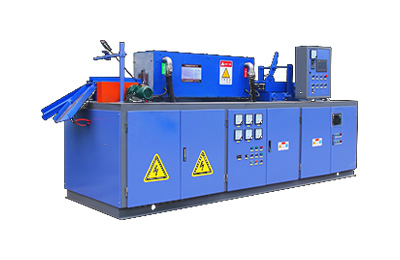mediate frequency induction heat treatment production line
With the development of intermediate frequency heating technology, thyristor frequency conversion technology is more and more used in the heat treatment process of round steel. The electromagnetic induction heating has the advantages of fast heating, automation, less burning loss, good heat penetration and other properties, which greatly improves the performance of round steel. Efficiency and quality stability of steel heat treatment. Here, the editor of Huaxin Electric Furnace will introduce this intermediate frequency induction heat treatment production line

1. Introduction of intermediate frequency induction heat treatment production line
The intermediate frequency induction heat treatment production line consists of two parts: quenching and tempering;
1. The quenching and heating part consists of three sets of intermediate frequency power supplies with different intermediate frequency power and two sets of heating induction coils; 600kW/2~4kHz power supply with four 600mm quenching and heating sensors; 100KW/4~8kHz power supply with a set of two sets 600mm quenching and heat preservation sensor; 100kW/8~16kHz power supply with a set of 2 sets of 600mm quenching and heat preservation sensor.
2. The tempering heating part is composed of three sets of intermediate frequency power supplies with different powers and multiple sets of heating induction coils; 360kW/1~2kHz power supply with a set of 6 sets of 600mm tempering heating sensors; 100kW/2~4kHz power supply with a set of 3 sets of 600mm tempering and heat preservation sensors, 100kW/4~8kHz power supply with a set of 3 sets of 600mm tempering heat preservation sensors; including quenching spray and tempering spray parts, as well as the corresponding air cooling section and transition section
2. The basic conditions and process requirements of the intermediate frequency induction heat treatment production line are as follows:
1. Process and technical parameters
1.1. Bar diameter range (mm): Φ24~Φ80
1.2. Bar length range (m): 2m~7m
1.3. Bar material: 35#, 45#, 40Cr, 42CrMo, 40CrNiMo, etc.
1.4. Product performance grade: 5.6, 8.8, 10.9, executive standard:
1.5. Quenching temperature range: 820℃~920℃
1.6. Tempering temperature range: 420℃~750℃
1.7. The maximum length (mm) of the hardness difference at the end of the bar end after quenching and tempering: 50mm (Note: the hardness of the core at the end of 50mm is consistent with the hardness of any point within the length of 50mm)
1.8. The straightness tolerance of the bar after quenching and tempering φt: t=0.0025∫ [∫ is the length of the bar (mm), the straightness of the bar before quenching and tempering φt=0.002∫]
1.9. Maximum production capacity: 2t/h per hour on average, accepted with φ56 diameter specification.
2.0. Equipment production acceptance requirements:
2.1. The diameter of the acceptance bar is φ30 (40Cr), φ56 (42CrMo), φ76 or φ80 (42CrMo)
2.2 The performance levels are: 8.8 and 10.9. The acceptance performance requirements and test requirements are in accordance with the provisions of GB/T3098.1.
3. Performance description of intermediate frequency induction heat treatment production line
1. The material is fed by inclined rollers, and the workpiece is conveyed at a constant speed in the state of self-rotation. The conveying line is controlled by frequency conversion, and the three parts of feeding, sensor and discharge are controlled separately; the rollers of the sensor part are made of stainless steel and cooled by water.
2. Adopt automatic feeding and automatic unloading; in order to facilitate the bundling and hoisting after unloading, the unloading table is of U-shaped structure; the unloading table is made of high-quality steel welded firmly and can withstand a certain impact load.
3. According to the safety standardization requirements of the machinery industry, all the rotating exposed parts of the machinery have reliable protective covers; the production line should meet the national environmental protection standards.
4. The intermediate frequency power supply adopts domestic famous brand components, which is reliable in use and low in failure rate. The power supply has the functions of water temperature, water pressure, short circuit and voltage loss protection.
5. The temperature of the production site is -5℃ in winter. In order to ensure that the equipment is not damaged by freezing, the equipment has reliable anti-freezing measures and discharge water protection measures;
6. In the process of quenching and tempering, there are online infrared temperature monitoring, and domestic thermometers are used.
7. The entire production process is automatically controlled by computer, and each branch can also be converted into manual control. Computer control software requires easy input and adjustment of process parameters, with query and storage functions. The control software is a software that runs successfully, with a 10-inch touch screen.
8. The appearance is colored gray, with two primers and two topcoats.

